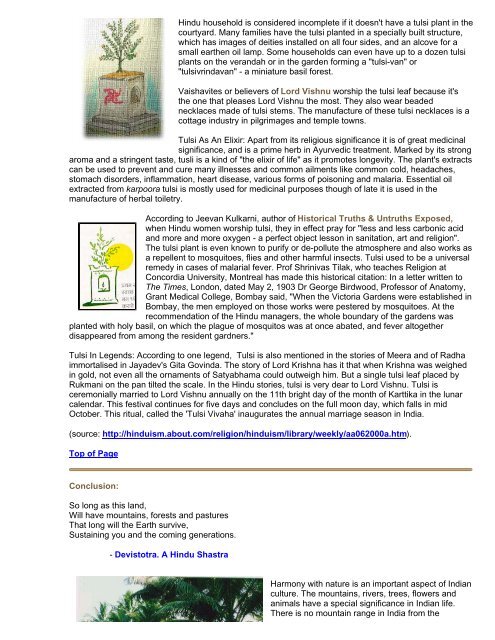A Tribute to Hinduism - Nature Worship - Mandhata Global
A Tribute to Hinduism - Nature Worship - Mandhata Global
A Tribute to Hinduism - Nature Worship - Mandhata Global
Create successful ePaper yourself
Turn your PDF publications into a flip-book with our unique Google optimized e-Paper software.
Hindu household is considered incomplete if it doesn't have a tulsi plant in the<br />
courtyard. Many families have the tulsi planted in a specially built structure,<br />
which has images of deities installed on all four sides, and an alcove for a<br />
small earthen oil lamp. Some households can even have up <strong>to</strong> a dozen tulsi<br />
plants on the verandah or in the garden forming a "tulsi-van" or<br />
"tulsivrindavan" - a miniature basil forest.<br />
Vaishavites or believers of Lord Vishnu worship the tulsi leaf because it's<br />
the one that pleases Lord Vishnu the most. They also wear beaded<br />
necklaces made of tulsi stems. The manufacture of these tulsi necklaces is a<br />
cottage industry in pilgrimages and temple <strong>to</strong>wns.<br />
Tulsi As An Elixir: Apart from its religious significance it is of great medicinal<br />
significance, and is a prime herb in Ayurvedic treatment. Marked by its strong<br />
aroma and a stringent taste, tusli is a kind of "the elixir of life" as it promotes longevity. The plant's extracts<br />
can be used <strong>to</strong> prevent and cure many illnesses and common ailments like common cold, headaches,<br />
s<strong>to</strong>mach disorders, inflammation, heart disease, various forms of poisoning and malaria. Essential oil<br />
extracted from karpoora tulsi is mostly used for medicinal purposes though of late it is used in the<br />
manufacture of herbal <strong>to</strong>iletry.<br />
According <strong>to</strong> Jeevan Kulkarni, author of His<strong>to</strong>rical Truths & Untruths Exposed,<br />
when Hindu women worship tulsi, they in effect pray for "less and less carbonic acid<br />
and more and more oxygen - a perfect object lesson in sanitation, art and religion".<br />
The tulsi plant is even known <strong>to</strong> purify or de-pollute the atmosphere and also works as<br />
a repellent <strong>to</strong> mosqui<strong>to</strong>es, flies and other harmful insects. Tulsi used <strong>to</strong> be a universal<br />
remedy in cases of malarial fever. Prof Shrinivas Tilak, who teaches Religion at<br />
Concordia University, Montreal has made this his<strong>to</strong>rical citation: In a letter written <strong>to</strong><br />
The Times, London, dated May 2, 1903 Dr George Birdwood, Professor of Ana<strong>to</strong>my,<br />
Grant Medical College, Bombay said, "When the Vic<strong>to</strong>ria Gardens were established in<br />
Bombay, the men employed on those works were pestered by mosqui<strong>to</strong>es. At the<br />
recommendation of the Hindu managers, the whole boundary of the gardens was<br />
planted with holy basil, on which the plague of mosqui<strong>to</strong>s was at once abated, and fever al<strong>to</strong>gether<br />
disappeared from among the resident gardners."<br />
Tulsi In Legends: According <strong>to</strong> one legend, Tulsi is also mentioned in the s<strong>to</strong>ries of Meera and of Radha<br />
immortalised in Jayadev's Gita Govinda. The s<strong>to</strong>ry of Lord Krishna has it that when Krishna was weighed<br />
in gold, not even all the ornaments of Satyabhama could outweigh him. But a single tulsi leaf placed by<br />
Rukmani on the pan tilted the scale. In the Hindu s<strong>to</strong>ries, tulsi is very dear <strong>to</strong> Lord Vishnu. Tulsi is<br />
ceremonially married <strong>to</strong> Lord Vishnu annually on the 11th bright day of the month of Karttika in the lunar<br />
calendar. This festival continues for five days and concludes on the full moon day, which falls in mid<br />
Oc<strong>to</strong>ber. This ritual, called the 'Tulsi Vivaha' inaugurates the annual marriage season in India.<br />
(source: http://hinduism.about.com/religion/hinduism/library/weekly/aa062000a.htm).<br />
Top of Page<br />
Conclusion:<br />
So long as this land,<br />
Will have mountains, forests and pastures<br />
That long will the Earth survive,<br />
Sustaining you and the coming generations.<br />
- Devis<strong>to</strong>tra. A Hindu Shastra<br />
Harmony with nature is an important aspect of Indian<br />
culture. The mountains, rivers, trees, flowers and<br />
animals have a special significance in Indian life.<br />
There is no mountain range in India from the

















